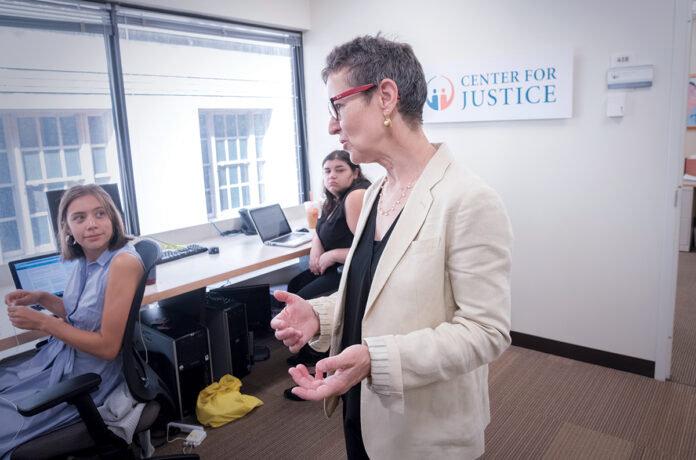
Jennifer Wood is the executive director of the Rhode Island Center for Justice, a Providence-based nonprofit that provides legal services for residents with low to moderate incomes.
Wood spoke to the Providence Business News about the impact of a new temporary moratorium on residential evictions, which applies to nonpayment of rent for households impacted by the COVID-19 pandemic. The temporary stay is being carried out by the R.I. District Court, following a federal order issued by the Centers for Disease Control and Prevention.
PBN: How does the eviction moratorium impact tenants right now?
WOOD: When the CDC took action at the end of last week, it took a lot of people by surprise. Here in Rhode Island, people have been working diligently to understand the scope of the CDC’s order and how it would be implemented.
It is certainly a powerful protection, based on public health and safety for tenants who otherwise might be facing housing instability right now. It’s critically important as a partial, nationwide solution. But there are significant gaps in the CDC’s action … gaps that we on behalf of low-income tenants, and frankly, the landlords who rent to them, have been trying to fill for months.
PBN: And what are these gaps?
WOOD: The gaps include that the CDC moratorium applies to evictions for nonpayment of rent. But it does not include evictions for other reasons, such as the lease having run its course and is now at its end. Even if someone is … completely up to date on their rent, the landlord can move to evict them because they wish to rent to another party or raise the rent.
PBN: Do you think the General Assembly should take additional action on this?
WOOD: There is a bill pending in the General Assembly for which we’re very grateful. It would take additional steps to close the gaps in the CDC’s order. We’ve also advocated very strongly for the governor to do so through executive action. The CDC provides her with a very strong, public health reason for doing so.
PBN: Why do you think the governor hasn’t taken action?
WOOD: I think the governor … was looking to see if there was going to be a national solution with some uniformity. Also, as it relates to rental assistance, because that’s pending in Congress. The [CDC order] does not address the underlying concern, of how is the rent going to get paid when the moratorium is lifted. And it does not address mortgage foreclosure. Everything that affects tenants affects landlords too. Some of them, certainly smaller landlords who own a few properties … have relied upon rent to pay their mortgages.
The pending legislation in the General Assembly provides for an eviction moratorium for all reasons … and provides for a mortgage foreclosure moratorium, recognizing that the landlords need that if their tenants are unable to pay the rent.
PBN: Are you starting to see tenants already filing these declarations with their landlords and the court?
WOOD: We have personal knowledge, with clients we represent, of declarations being filed at the end of last week and this week.
Mary MacDonald is a staff writer for the PBN. Contact her at MacDonald@PBN.com.












